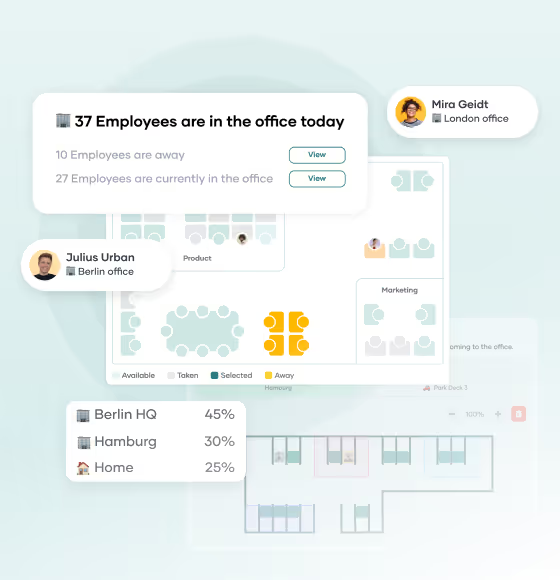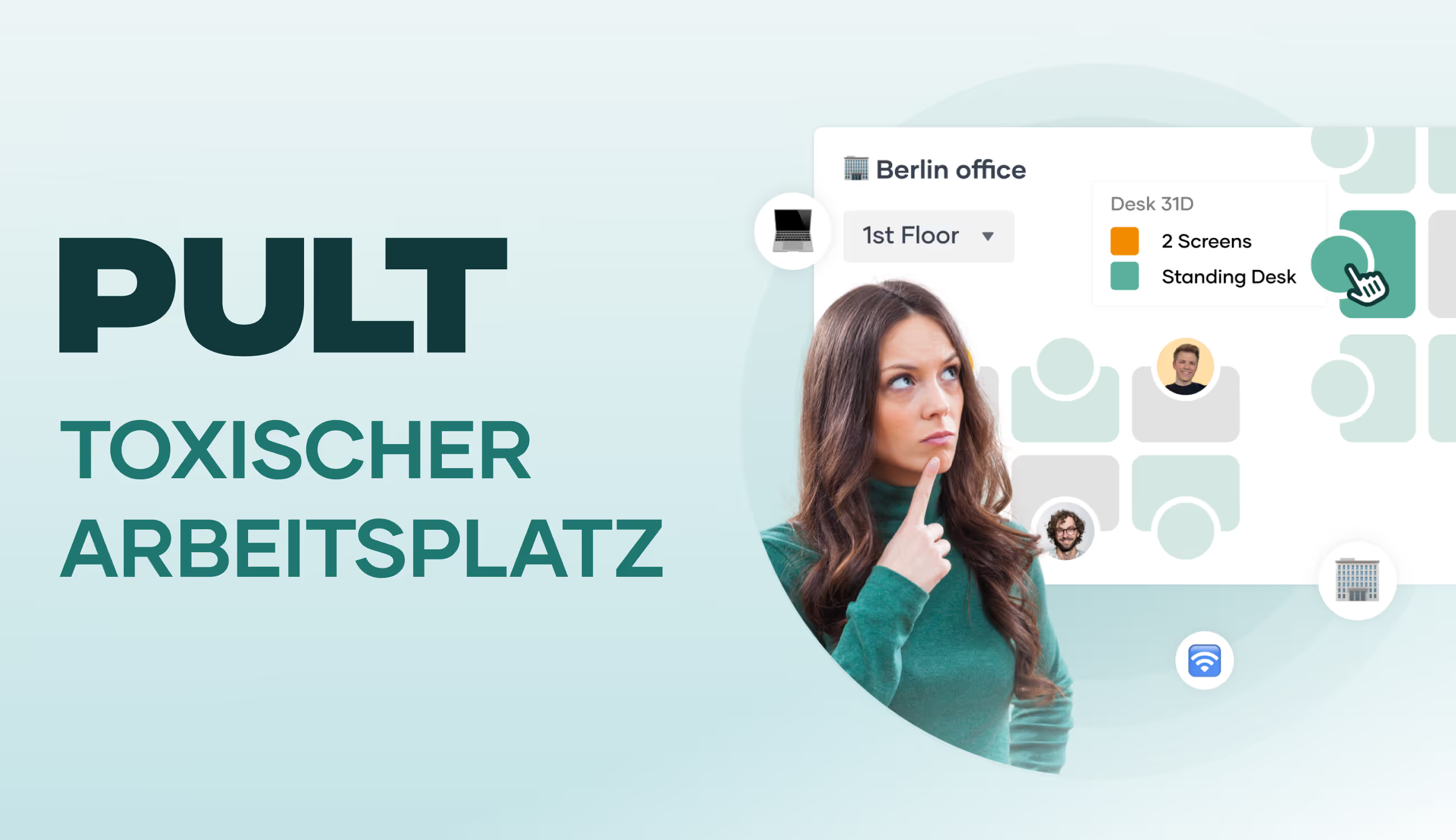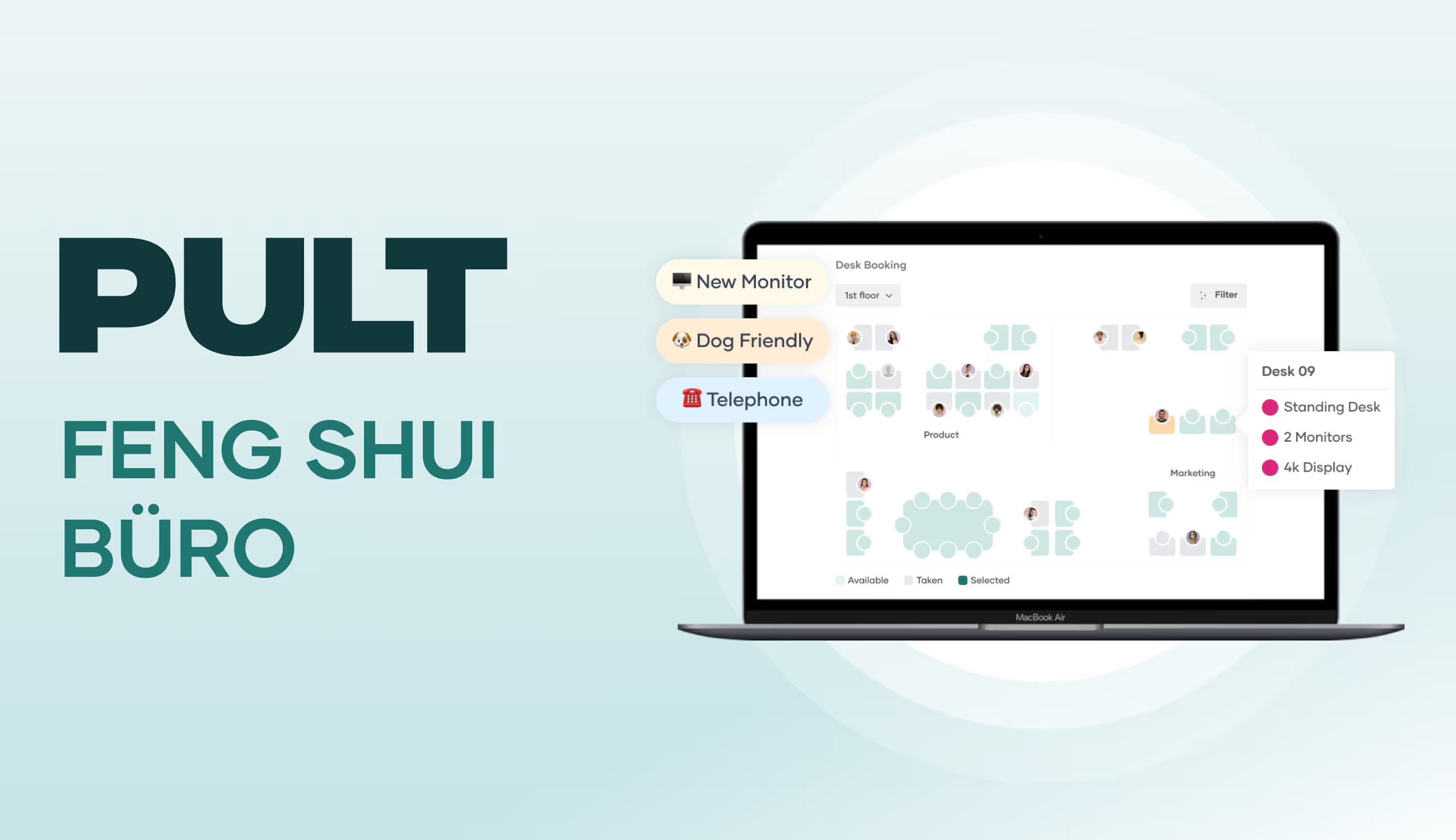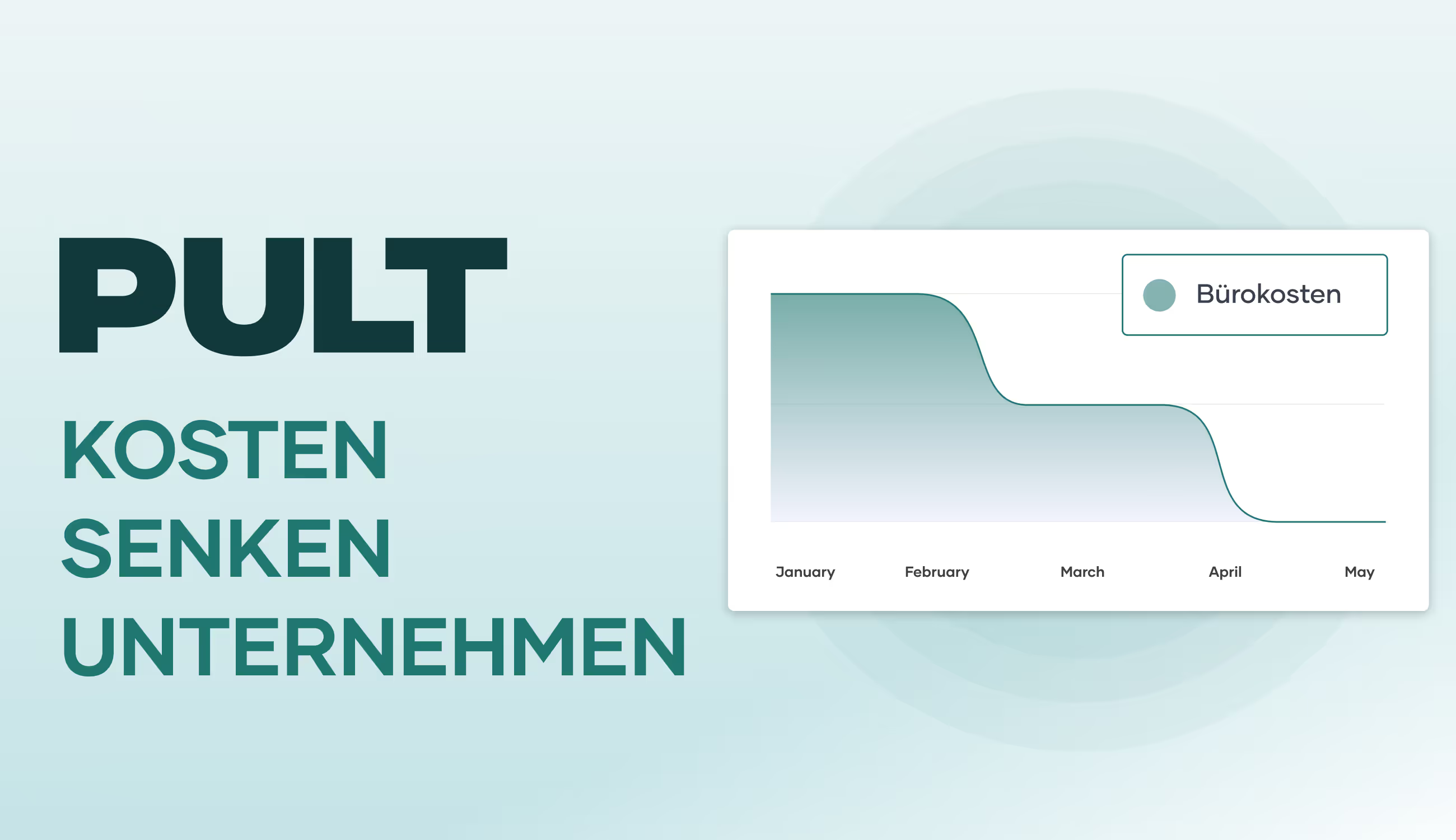Guide: Understanding and implementing desk sharing rules
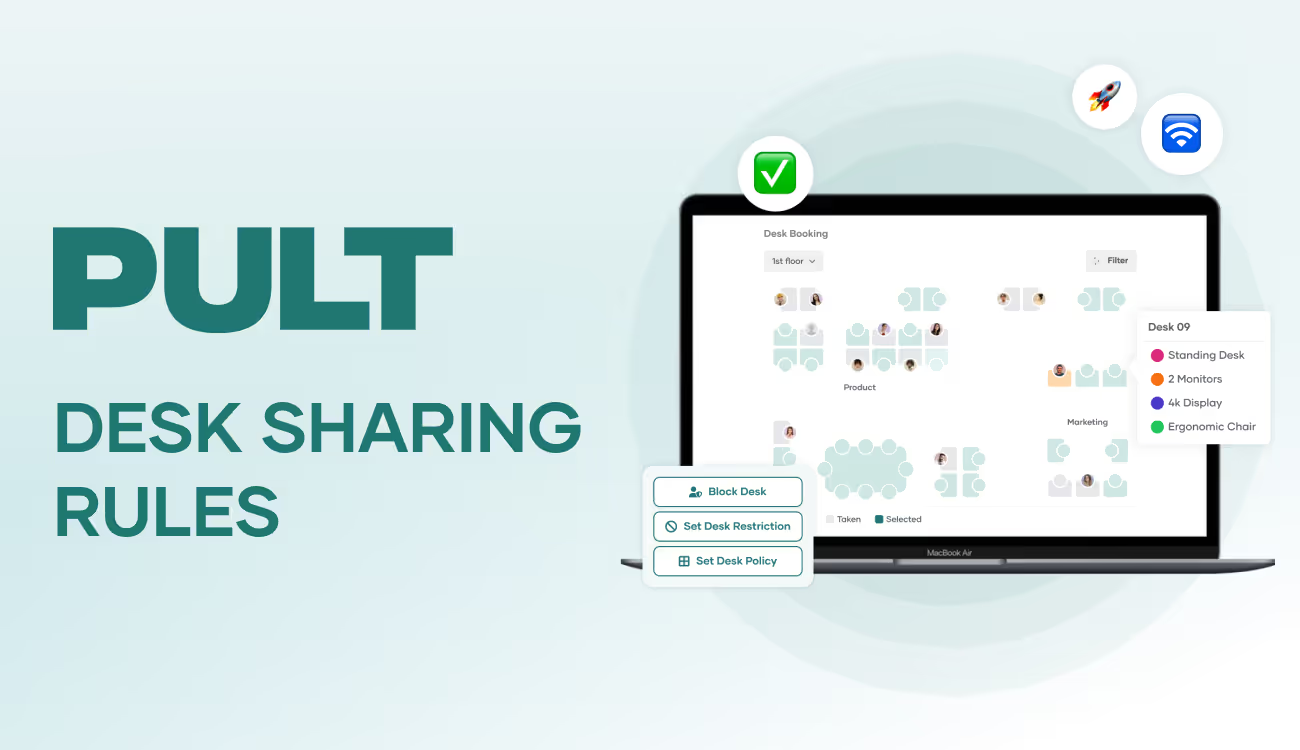
Desk sharing: Rules for introduction and daily collaboration
The most important points about desk sharing rules in brief:
- Desk sharing requires clear rules for behaviour, organisation and technology.
- The earlier all colleagues are involved, the more successful the acceptance of desk sharing rules and the cooperation of the team will be.
- The desk sharing rules should be written down, communicated and easily accessible (e.g. on the intranet).
- With PULT, desk sharing rules can be easily implemented thanks to desk bookings, automatic check-ins and utilisation analysis.
- The rules are most effective when there is an open feedback culture and the guidelines are continuously developed.
What types of rules are needed for desk sharing?
In desk sharing, fixed desks give way to a system in which employees decide and book where they work on a daily basis. This requires a certain degree of coordination and rules.
Desk sharing affects various levels of everyday working life, each of which has its own requirements. The types of rules also differ accordingly:
- Rules of conduct (etiquette): These concern immediate interaction in the workplace. They are about respect, consideration and adherence to common standards. Examples: do not leave rubbish or food leftovers behind, keep noise levels down, tidy away personal belongings at the end of the day.
- Organisational rules: Who can work where and when? How are bookings made? Are there any restrictions? These questions need to be addressed in the form of guidelines and internal FAQs, or the answers should be stored in the booking system itself. Responsibilities such as technical problems also fall into this area.
- Technical rules: Organised desk sharing is managed via software: booking tools, room occupancy displays or calendar integration. The systems themselves define rules about who has access, how far in advance bookings can be made, and whether a space is released again if the person does not show up.
- Formal vs. informal rules: Some rules are not written down and develop over time as part of the culture or through habits within the team. Others, however, should be documented in order to create commitment and benefit the well-being of all.
The 9 most important rules for desk sharing
The following rules are suitable for posting in your office. They define the basic behaviour for using the workspaces.
1. Reservations only via the booking system
Desks, rooms and zones can only be reserved via our booking system. Bookings can be made in advance, even days or weeks beforehand. Blocking spaces with bags or jackets is not permitted.
Tip: Find out more about the PULT desk booking system here.
2. Leave your workspace as you would like to find it
Clear your space after work. Only leave the fixed equipment on the table. Remove any food leftovers, wipe down the desk if necessary and make sure that the next person can start without any hassle.
3. Take your personal belongings with you every day
Do not leave personal items behind permanently, even if you have already booked the same space for the next day. Use our lockers and storage compartments for storage. Find out more under Clean Desk.
4. Only occupy what you really need
Adjust your booking to your usage and reserve exactly what you need for your work. However, avoid using larger desks or meeting rooms on your own. Others may need these spaces later. Use the space as efficiently as possible.
5. Do not hold meetings at the shared desk
Telephone calls, video calls and group meetings should be held in designated rooms whenever possible. If you have no alternative, use headphones or keep your conversation brief. The open workspace is intended for concentrated work.
6. Respect the peace and quiet of others
Do not talk across several desks, avoid loud noises or long phone calls. If you want to discuss something with your team, change location or speak quietly.
7. Hygiene is everyone's responsibility
Use our hygiene stations, where you will find disinfectant spray and wipes. Wipe down your desk and chair armrests as needed.
8. Stay at home if you are ill
If you feel ill, work from home or call in sick. We respect the health of our colleagues and want to avoid infection as much as possible.
9. Address rule violations fairly
If you notice that colleagues are repeatedly ignoring the rules, address it. If this is not possible or is met with resistance, bring it up in the team meeting, talk to us or send us an anonymous message.

What needs to be regulated before introducing desk sharing?
Desk sharing changes daily routines, the functions and use of rooms, and the understanding of roles within the team. Therefore, it is important to introduce the concept in a well-thought-out manner. This begins with clear rules and responsibilities.
Communicating the introduction of desk sharing
Before you introduce desk sharing, your team should understand why the concept is being introduced and what benefits it promises. Communicate openly and objectively to manage expectations and address any uncertainties that arise immediately.
Involve your team in the rules for the new working model at a very early stage. Use question and answer sessions and provide opportunities for feedback. You should signal that you are open to concerns and reservations at any time and that you take them seriously.
Create the right conditions
- How many places are available?
- Are there any restrictions, such as fixed team zones?
- Will work be done with or without booking?
- Are there special arrangements for certain roles or on certain days?
Document these points and make them available internally. This can be done on the intranet, in the onboarding area or as a notice in the office.
Assign responsibilities
Determine who is responsible for the booking system and who can be contacted if rules are not followed. Also determine who is responsible for ensuring compliance with the rules and who should check compliance regularly.
Unspoken desk sharing rules: etiquette
Interpersonal etiquette complements the formal rules with what is often tacitly expected in everyday working life: consideration, attentiveness and a feel for the situation. This is particularly important in desk sharing because personal routines and working methods take place in shared spaces. Minor tensions can disrupt the flow of work.
Etiquette refers to polite, functional behaviour in a shared space. In other words, behaviour that is in line with the desk sharing concept and the working methods of colleagues.
Ask questions instead of interpreting
If you want to use a space that may already look occupied, for example by a jacket or a notebook, talk to the person instead of simply moving things aside. Especially in open-plan workspaces, communication is often a better solution than interpretation.
Tip: In PULT, the reservation status and usage of all workspaces are immediately visible. A glance at the office plan makes it immediately clear which spaces are actually occupied or free.
Avoid territorial behaviour
Desk pads, lamps or personal coffee cups almost act as a territorial claim. If desk sharing is really a consistent concept in your workplace, then the rule is: everyone adheres to the posted rules and stores personal items in a locker at the end of the working day.
Be considerate with noise
You cannot and should not avoid all noise, but you can be considerate. Only listen to music and voice messages through headphones. Limit the length of phone calls or move to other areas for longer conversations.
Do not reconfigure devices and technology
After you have finished work, your workspace should be returned to its neutral state. This applies, for example, to the position of the monitor and chair.
Reduce sources of scent and noise
Strong perfume, loud chewing gum or opening food with a strong smell can disturb others. However, many people are too polite to mention it. Therefore, be sensitive about this yourself.
Respect silent signals
If someone is sitting with noise-cancelling headphones, has their screen tilted significantly to the side, is wearing a hood or is otherwise visibly isolating themselves, this is a silent but clear signal. You should only approach these colleagues with matters that cannot wait.
Desk sharing rules for booking software
Booking systems for desk sharing set rules that are not always documented separately but directly influence everyday office life. They determine when a workspace can be reserved, how long a booking is valid, what happens in case of no-shows, and who has which rights in the system.
If these rules for desk sharing software have consequences for employees or collaboration, you should disclose them to your team.
Booking requirements and deadlines
In some booking systems, you have to book your space in advance, while in others you can check in spontaneously. It is important that everyone knows when bookings can be made, how far in advance reservations are possible, and whether certain days or times are blocked. Cancellation deadlines also play a role: if you cancel too late, you may be blocking a space that others could have used.
Tip: In PULT, you can book your workspace in advance or check in when you enter the office. With PULT Presence, this is even done completely automatically.
No-show rules
Automatic release is a useful feature in the software: if someone does not take their booked space within a specified time window, the space is released again for all colleagues.
Rights and roles
In good booking software, booking rights can be distributed differently. Some users are only allowed to make reservations for themselves, while others, such as team leaders or assistants, can also book spaces for colleagues. Workspaces or zones can also be reserved for specific groups. You should communicate these role and access structures openly to your team.
Integration into calendar and communication
PULT can be linked to Outlook, Google Calendar or MS Teams. This means that desk bookings are displayed directly in the calendar or can be adjusted with a single click.
Data protection and tracking
The PULT booking software allows you to evaluate office usage and utilisation and shows permanently booked and rarely used workspaces. However, in order to remain GDPR-compliant, no conclusions about the booking behaviour and attendance of individual employees may be drawn from this data.
Put desk sharing rules in writing: template for your company
If you introduce desk sharing in your company, you should put the most important rules in writing. This gives your team the necessary guidance and helps them to use the system reliably in everyday life.
Above all, rules on booking, use, consideration in everyday life, technology, check-ins and exceptions should be recorded, i.e. all points that could lead to misunderstandings in everyday working life. Depending on your organisation, you can design the rules as a short overview on the intranet, as a notice or as part of an internal desk sharing policy.
Booking:
Workspaces must be booked in advance via PULT. Last-minute changes are possible as long as spaces are available.
Use:
Workstations must be completely cleared after use. Personal belongings may not be left behind permanently.
Conduct:
Conversations should be held at a normal volume; no phone calls without a headset. Please be considerate of colleagues who are concentrating on their work.
Technology:
Monitors, docking stations and accessories may be shared, but must not be permanently moved.
Check-in:
The workstation is considered occupied once you have checked in. Unused reservations will be released after 20 minutes.
Absence:
In the event of illness, holiday or remote working days, the booking should be cancelled in good time.
Support:
For technical questions or booking problems, please contact [name or function]. Feedback on usage is welcome.
{{cta}}
What typical problems can be solved by desk sharing rules?
Clear desk sharing rules prevent the typical problems that repeatedly arise with desk sharing: blocked spaces, disruptive noise in the workplace or misunderstandings when booking.
If you identify common problems early on and address them in a targeted manner, you will create the conditions for desk sharing to work in everyday working life. The following examples show which situations are particularly likely to cause dissatisfaction and how you can counteract them with simple rules.
Problem 1: Spaces are kept occupied without anyone being there
Solution 1: Introduce binding bookings with clear check-in times. If you use a system with automatic release in case of no-shows (e.g. after 20 minutes), make this explicit. This will prevent seats from being blocked but left unoccupied.
Problem 2: Personal belongings are left at the workplace permanently
Solution 2: Specify that all workspaces must be cleared at the end of the day and provide personal storage facilities (lockers, boxes) at the same time.
Problem 3: Disturbances caused by phone calls or conversations
Solution 3: Make it clear that shared desks are primarily intended for quiet work. For longer phone calls or consultations, quiet rooms or other areas should be provided and used.
Problem 4: Frustration over workstations that cannot be found
Solution 4: Clarify how many spaces are available and how they can be booked. Use the real-time display in PULT and define responsibilities for questions or problems.
Problem 5: Unequal treatment or informal special rules
Solution 5: Ensure that all rules apply equally to everyone, regardless of position or team affiliation. If there are exceptions, for example for graphic designers or video editors with specific hardware requirements, document them in a comprehensible manner.
How do I enforce desk sharing rules?
Desk sharing rules are best established through role modelling, open communication in both directions and comprehensible processes for the entire team. If your team understands why certain rules apply and how they can be applied in everyday life, commitment will develop without the need for constant monitoring.
- Orientation: Give your team clear guidance on what is expected, what rules apply and what behaviour is desired.
- Address violations: Address any violations immediately. Remain direct and objective. Explain the behaviour and point out the applicable rules.
- Feedback and further development: The rules must fit in with everyday life. Therefore, regularly seek feedback from the team and adjust the rules where something proves to be impractical or ambiguous.
- Distribute responsibility: If desk sharing is organised in larger teams or across multiple locations, appoint designated contact persons. They can clarify questions, point out rule violations or collect feedback.
Compliance with desk sharing rules with PULT
PULT is a desk booking software that helps you implement your desk sharing rules. You and your team can use the software to book your desks, meeting rooms and zones. At the same time, you have access to the following functions:
Define booking rights & restrictions
With PULT, you can specify exactly who is allowed to book what: you can make certain desks or areas, such as team zones, available only to specific users or teams. This can be done on a daily basis and apply to departments or roles that you specify.
Booking duration & advance booking
PULT allows you to define booking periods in advance, for example, how far in advance reservations can be made. Resources (seats, rooms, zones) can also be blocked for a period of time, for example, if renovation or cleaning work is scheduled.
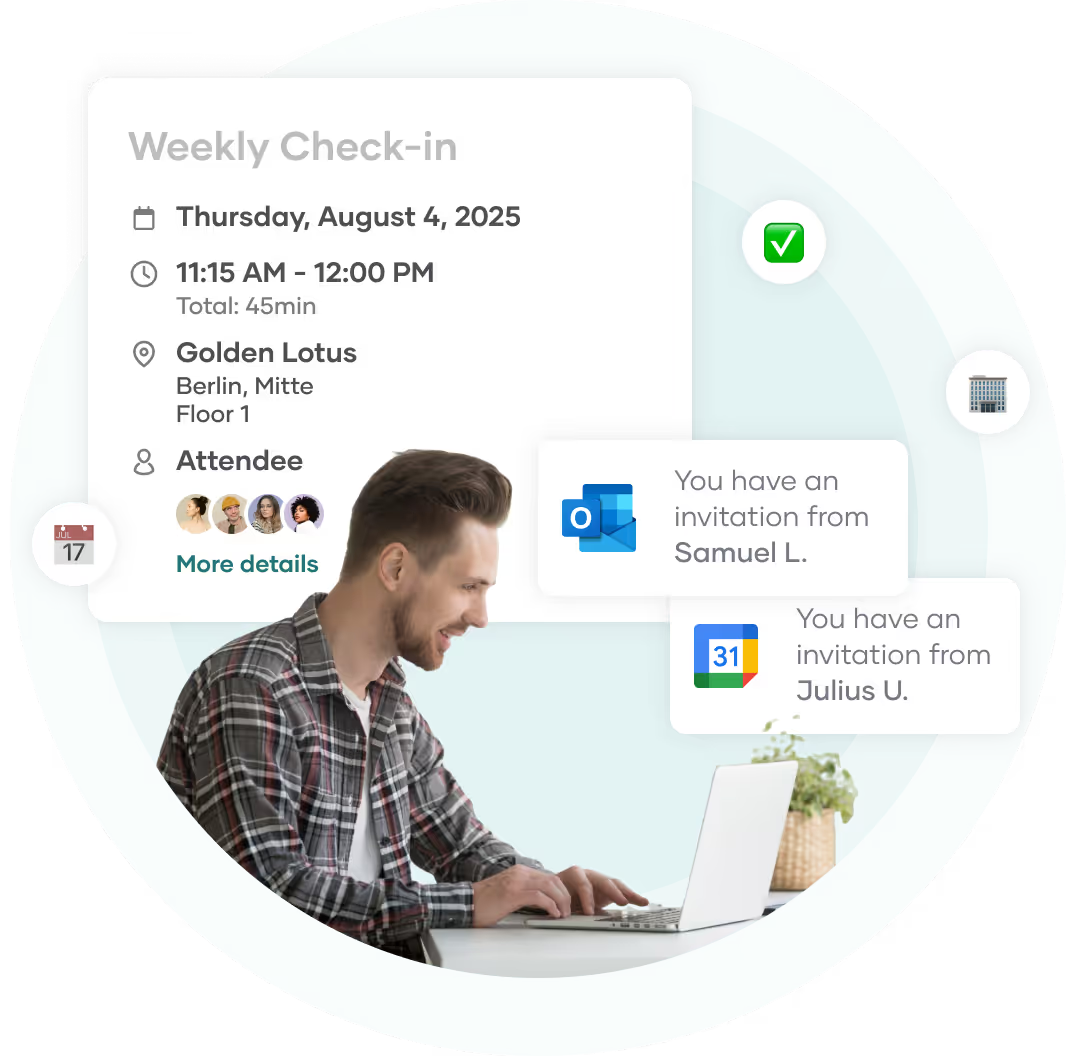
Clear rules for the team
The dashboard shows your colleagues which rules apply: who is allowed to book, which spaces are blocked and after how long approvals are granted.
Automatic check-in & no-show rule
The automatic check-in function via your existing Wi-Fi using PULT Presence ensures that booked spaces are automatically occupied or released again after a defined period of time if users do not show up.
Feedback & usage evaluation
With PULT Office Insights, you can analyse the usage of your office, sorted by team, area and time slot. There is also the option of collecting feedback from the team to gauge the effectiveness of the rules or satisfaction with desk sharing.
Tip: Find out more about office evaluation in PULT here and desk booking here.
Desk sharing rules – Frequently asked questions and answers
What should you do if someone constantly blocks a desk sharing space without showing up?
Speak to the person directly and objectively or forward the case to the responsible contact person. In such cases, PULT automatically releases the space. You can set the waiting period after which this happens yourself.
How strictly should desk sharing rules be enforced?
The desk sharing rules should be displayed in a visible place in everyday life. It is important that they are understood, accepted and supported by role models in the team.
What do I do if all spaces are permanently booked out?
Check whether spaces remain unused because booked tables are not being used. Automatic releases for no-shows and clear booking periods in PULT help you to manage capacity utilisation fairly. To ensure that your office does not reach its capacity limits in the first place, you can analyse capacity utilisation in Office Insights.
How do I formulate desk sharing rules without making them seem like regulations?
Reflect on the common goal: functional working for everyone and free spaces when they are needed. Formulate the rules in a positive, understandable way and always in relation to the benefits they bring to everyone.
A new hybrid workplace experience is coming. Start Now. 🎉
A new hybrid workplace experience is coming. Start Now. 🎉
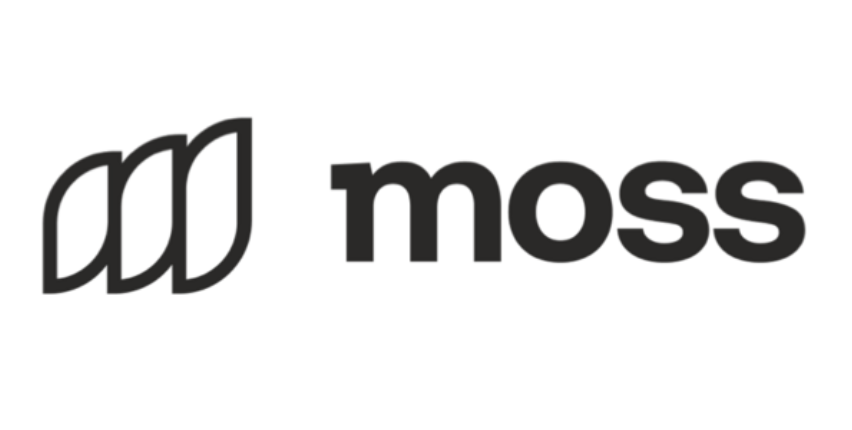




















.avif)


